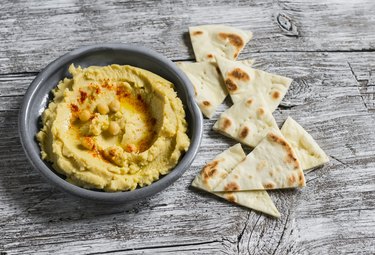
Hummus and other legume-based dips are healthy plant-based, high-protein foods. Hummus, made from chickpeas, is particularly well suited to high-protein diets and plant-based diets. However, on certain diets, hummus should only be consumed in moderation.
Tip
It's perfectly acceptable to eat hummus on a diet. However, this dip can be rich in fat, protein and carbohydrates. So eat hummus in moderation, depending on the specific diet you're following.
Video of the Day
Video of the Day
Eating Hummus on a Diet
Hummus is a chickpea-based dip. It's essentially chickpeas that have been blended with oil. If you're eating traditionally made hummus, it will also contain tahini, lemon juice and garlic.
There are also quite a few variations of hummus. Your hummus might contain herbs and spices like cumin, sumac or parsley. Nontraditional hummus might even be made using different beans, like white beans or black beans instead of chickpeas. If you want alternatives to plain hummus, you could try these LIVESTRONG.com recipes for Roasted Beet Hummus and Pumpkin Hummus.
According to the USDA, 100 grams (3.5 ounces) of commercially sold hummus has 166 calories, 7.9 grams of protein and 9.6 grams of fat (1.4 grams come from saturated fat). A serving of 100 grams of store-bought hummus also has 14.3 grams of carbohydrates; 6 grams of these carbohydrates come from dietary fiber.
Homemade hummus can be a bit different in its nutrition. Preparing your own hummus allows you to make ingredient swaps, which can be much healthier if you want to eat hummus and diet. For instance, you can add less salt or use different oils. Making hummus with a mixture of flaxseed oil and olive oil can also increase your omega-3 fatty acid intake.
The USDA says that 100 grams (3.5 ounces) of homemade hummus has 177 calories, 4.9 grams of protein and 8.6 grams of fat (1.1 grams come from saturated fat). Every 100 grams of homemade hummus also contains 20.1 grams of carbohydrates, and 4 grams of these carbohydrates come from dietary fiber.
Any ingredient swaps you make can change the nutrition of the hummus. However, as long as you're using chickpeas, your hummus is likely to contain most of the same essential nutrients listed by the USDA. Hummus is typically rich in vitamins and minerals like copper, manganese and B-complex vitamins.
Read more: 16 Diet-Friendly Healthful Carbs
High-Carb, High-Fat and High-Protein Diets
Hummus is certainly healthy. It's particularly rich in fiber, a nutrient that the Food and Drug Administration says most Americans don't consume enough of — but that doesn't mean that hummus is compatible with every diet.
There are myriad diets you can follow if you're trying to lose weight. Some of the most popular are high-carb diets (which are primarily plant-based), high-fat diets (which restrict your carbohydrate intake), and high-protein diets. And some people simply choose to reduce their calorie intake.
According to the Mayo Clinic, on the average Western diet, people mainly consume carbs. Specifically, 45 to 65 percent of your calories come from carbohydrates.
If you're following a standard Western diet and trying to lose weight, the calories contained in a snack of carrots and hummus can be ideal. It's definitely much healthier and lower in calories than a bag of potato chips or a chocolate bar. Legumes like chickpeas are high-protein foods, so hummus is a particularly healthy choice for people following plant-based and high-protein diets.
Hummus should be consumed in moderation if you're following a low-carb, high-fat diet. According to the Mayo Clinic, most low-carb dieters need to limit their carbohydrate consumption to 20 to 60 carbohydrates per day. A tablespoon or two of hummus can be healthy, but more than that might interfere with your weight-loss goals if you're following such a diet.
Ultimately, if you want to consume hummus and diet, you'll need to keep an eye on your macronutrient goals. A little hummus can be a healthy choice for just about anyone, but only a few diets will allow you to eat more than a few ounces of hummus a day and still lose weight.